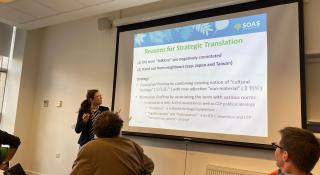
Breadcrumbs navigation
A theory of international technology regulation
Florian Rabitz discusses the key points from his new Review of International Studies (RIS) article. If you'd like to know more you can read the full article at - A theory of international technology regulation
Too early or too late: technology as a problem for international cooperation.
Technology has become a foremost governance problem in world politics. Novel biotechnologies are reshaping public health and agri-food systems, and offer potential ways for the large-scale genetic engineering of entire species and ecosystems to cope with the global environmental crisis. Recent developments in Artificial Intelligence (AI) have staggering political implications that range from autonomous warfare to the existential risk of a hypothetical superintelligence takeover scenario. Quantum computing provides unprecedented decryption capacities that could make many forms of military and commercial communication unsafe. In the Russian-Ukrainian war, drones are presently transforming the very nature of militarised interstate conflict. Robots outfitted with advanced AI models could be next. Technical proposals for artificial sunlight dimming, referred to as solar radiation modification, have entered the mainstream of the global debate on climate policy. Meanwhile, the idea that humanity would use large-scale technological systems for the artificial removal of atmospheric carbon dioxide during the second half of this century has become so widely normalised that most governments and international organisations consider it an integral part of long-term climate policy planning.
For many, or most, of these and other technological issue areas, international rules are necessary to ensure that potential benefits are appropriated, and that risks are properly managed. Governance instruments for technology transfer can ensure broad diffusion and uptake of novel technologies with beneficial consequences for sustainability or economic development. Arrangements for risk assessment and management can make sure that transboundary threats, for instance from large-scale technological accidents or from harmful genetically modified organisms, are handled properly. Institutional solutions of one form or another are indispensable for dealing with technologies that can cause major cross-border impacts, both of a positive and a negative kind.
But technology as an object of international cooperation may pose a fundamental problem. On one hand, international cooperation faces unique challenges when addressing new technologies. This is because the significant uncertainties that tend to be associated with new technologies can hamper effective cooperative responses. It is also because new technologies tend to be distributed quite asymmetrically, and the policy preferences of innovator states tend to diverge from the preferences of other states. Both of these effects taper out over time: Uncertainty decreases as more information becomes available, and preference decreases as technologies diffuse and are adopted by growing numbers of countries. But initially, new technologies tend to present particularly severe collective action problems that limit scope for creating effective international regulatory frameworks.
On the other hand, international cooperation also faces challenges when dealing with established technologies. As technologies mature, they consolidate themselves as parts of wider socio-technical systems. What is at first no more than, say, an electric vehicle gradually becomes enmeshed with technical infrastructures, interest groups, advocacy coalitions, informal organisational practices, and so forth. Socio-technical systems tend to be resilient to regulatory interference, which is for instance why the world still generates the vast majority of its energy supply from fossil sources. New regulations thus tend to be layered on top of the rules, routines, and practices that already exist in a given socio-technical system. This means that international rules for established technologies tend to codify pre-existing regulatory frameworks without deviating from them in any meaningful way. This is why, for instance, the swath of international nuclear agreements that were adopted during the 1980s and 1990s closely mirrored the soft governance arrangements created during the 1960s and 1970s.
The combination of these two factors, collective action problems for novel technologies and path dependence for mature technologies, does not bode well for the prospects of international cooperation: Quite often, it will either be too early or too late to find fair, effective, and responsible solutions for technological challenges in global politics. As these challenges intensify, we need to carefully manage our expectations of what international institutions can reasonably achieve.
Want to know more? You can read the full article at DOI: https://doi.org/10.1017/S0260210524000962
BISA members receive access to RIS (and to our other journal European Journal of International Security) as a benefit of membership. To gain access, log in to your BISA account and scroll down to the 'Membership benefits' section. If you're not yet a member join today.
Photo by Alexandre Debiève on Unsplash


